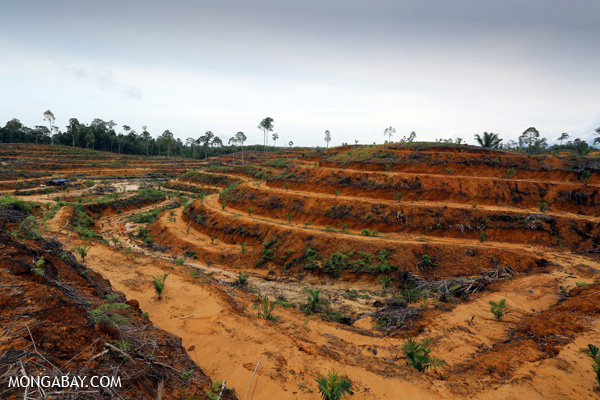For the sixth episode of its third season, HBO’s Emmy-winning news series, VICE, focused its lens on Indonesia’s palm oil industry. The episode, entitled, “Indonesia’s Palm Bomb,” follows VICE correspondent, Ben Anderson, as he investigates the environmental and social impact of widespread (and, at times, illegal) deforestation on wildlife and indigenous communities in Sumatra.
In a recent interview with Mongabay.com, Ben Anderson describes his firsthand experience witnessing slash-and-burn forest clearing, local indigenous community opposition, and on-the-ground efforts to conserve wild orangutan populations.

VICE correspondent Ben Anderson with conservationist Mike Griffiths walking in a hazy Indonesian village. Credit: Jackson Fager/HBO
AN INTERVIEW WITH BEN ANDERSON
Mongabay: In the episode, we see local indigenous communities fighting the palm oil industry’s imposition on their ancestral lands by committing small acts of retaliation. For example, a bulldozer was stolen (which was then repurposed as a support for a clothesline), and illegally planted palm oil trees were cut down. What was your impression of the effectiveness of tactics like this?
Ben Anderson: On a local level, the acts of vandalism were working, they continued after we left and I have since heard that local palm oil companies were having their licenses revoked, but there are so many companies, and so much opportunity for bribery, that it’s a constant, uphill struggle. On the ground, the activists were very pessimistic, or stuck in a “stalemate” as it was often described. What they really need is international pressure to make sure that the palm oil is legally and sustainably sourced. But there doesn’t seem to be much of a movement in that direction so far…
Mongabay: In addition to the unconventional opposition tactics taken by indigenous communities, we see Western scientists leading radical conservation efforts. Did these two groups work together?
Ben Anderson: The two groups were working together where possible, but again, often off the record, they were very pessimistic about what they might achieve. They often said we were at the critical point but later, off the record, they admitted to fears that the critical point has already passed. It was heart breaking to see those brilliant people have to effectively hunt wild orangutans, just to save them. They said that when it’s got to that point they have already lost. If the habitat were saved, individual creatures wouldn’t need to be. And for every one saved, they told me that many were killed.

Forest clearing for oil palm in Aceh, Sumatra. Photo by Rhett A. Butler
Mongabay: Not only does Indonesia produce the most palm oil, but it is also a significant consumer of it. Did you get the sense amongst Southeast Asians that there is a desire for sustainable palm oil in their own domestic products?
Ben Anderson: Anything I say here will be anecdotal, as I didn’t really look into in detail, but I saw no domestic demand for sustainable palm oil, from consumers. A small group of activists were trying to persuade people of the damage being done, but there certainly doesn’t seem to be a critical movement towards sustainable production. That said, local farmers have seen the damage done, through the loss of things like their natural water sources, or smoke damage, so perhaps, hopefully, that will lead to greater awareness. Of course it may well be too late by then.
Mongabay: Did you meet with any local politicians when you were there? If so, did you get a sense of how they feel about the uncontrolled growth of the palm oil industry?
Ben Anderson: We didn’t. We’d seen what happened when other people did the same thing, and knew what answers we’d get.

An orphaned orangutan in a rehabilitation center in North Sumatra.
Mongabay: As a viewer, the scene where you were choking on smoke from the forests burning stands out as one of the more viscerally upsetting moments from the whole series. Can you talk more about what that was like?
Ben Anderson: Yes, being engulfed in that smoke, having just learned how much more damaging many of the fires in Indonesia are, was heartbreaking. It was an apocalyptic scene, and yet it was just a drop in the ocean compared to all the fires that are occurring every day out there. I was there with Mike Griffiths, an oilman turned environmentalist, a brilliant man, supremely knowledgeable and utterly convincing. He’s been trying to highlight this for decades, and yet there we were, surrounded by burning forest, with levels of destruction that are only increasing, and with almost no international awareness or pressure. I’ve seen the destruction of the Amazon, which is bad enough, but in Indonesia it’s far worse, because much of the forest is on peatland, so it was a devastating thing to see. And of course all this is for a product we consume several times every day, without even knowing it…very sad.
Stream VICE’s “Indonesia’s Palm Bomb” online via HBO Now.